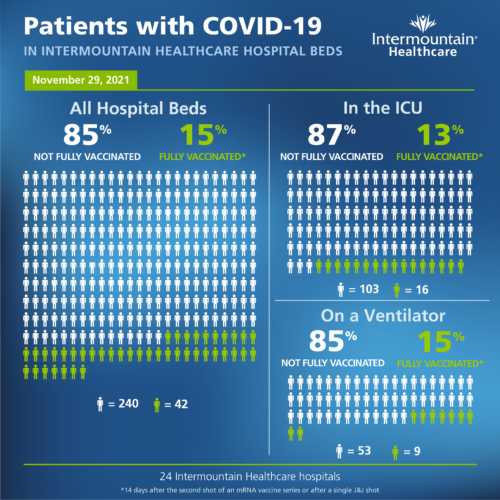Intermountain official warns of continued protective measures, vaccination due to omicron

Courtesy Intermountain Healthcare
This graphic lists vaccination statistics for patients being treated at Intermountain Healthcare facilities as of Monday, Nov. 29, 2021.The COVID-19 omicron variant is only six days old, which means health care workers don’t know a whole lot about it yet.
What they do know for certain is the fact that the delta variant is still hitting Utahns pretty hard and that’s where the focus needs to be at the moment, health officials say. On Friday, the Utah Department of health reported 1,195 new cases from the previous day. Testing is also down, which means those numbers are probably higher than reported.
“Right now, our ICU hubs across Intermountain Healthcare systems are at 102% capacity,” said Dr. Eddie Stenehjem, an infectious disease physician at Intermountain Healthcare, during a press conference Tuesday. “We shouldn’t lose sight of what’s happening in Utah. We had 20 new deaths today. Delta is affecting us and this is where our focus needs to be right now. We have a feeling of dread of what’s to come after the Thanksgiving holiday.”
Stenehjem said the vast majority of hospitalizations over the past three months are among those who are not vaccinated or not fully vaccinated. According to Intermountain data, approximately 15% of patients hospitalized have breakthrough infections, but they’re also older or have complicated medical problems.
“These are people who fail vaccines in general and haven’t been able to generate an immune response to protect them,” Stenehjem said. “We know there is waning (effectiveness) of the vaccine, especially when you get out to six months. Getting the booster gets you back up to those original levels of protection.”
Stenehjem said the current vaccines are the most studied in history and people should not feel skeptical about them.
“These vaccines are under the microscope every day. They are safe and they prevent severe disease. The science is clear. It’s not subtle,” he said. “The virus is very real. Our hospitals are full with ICU patients with COVID. I hope people are getting their information from reputable sources.”
While delta is still at the forefront, Stenehjem said omicron is being watched very carefully and more information should be available in a couple of weeks.
“Omicron has over 50 mutations. Delta has nine,” he said. “Those mutations could lead to different characteristics such as whether or not it’s more contagious or less contagious or causes more disease or less. Right now, we know very little about what the consequences might mean, if anything, and whether or not this is going to be a big deal for us.”
Stenehjem did note, however, that only 24% of the population in South Africa, where the omicron variant originated, is vaccinated. Over 60% of Utahns are vaccinated, which still is not enough to prevent new variants from emerging. He said not only should people get vaccinated to protect against the delta variant but also to protect against the possibility of the omicron variant rearing its head in Utah.
“The vaccine is the way to prevent ongoing developments of variants,” he said. “If you haven’t been vaccinated, get vaccinated and get the booster when appropriate.”
Stenehjem also said it’s still important to wear a mask indoors if you aren’t vaccinated or you are around those whose vaccination status is unknown.



